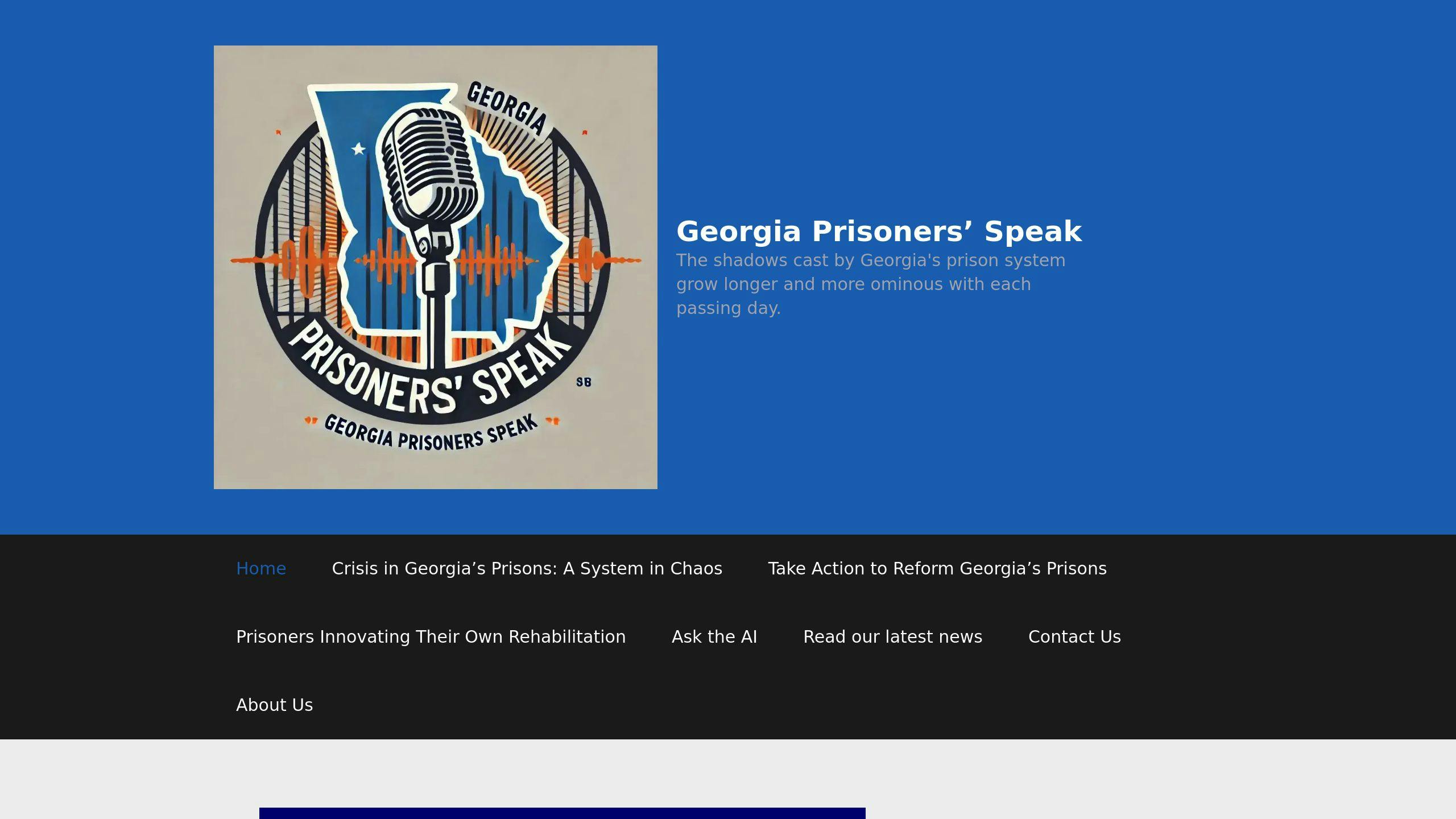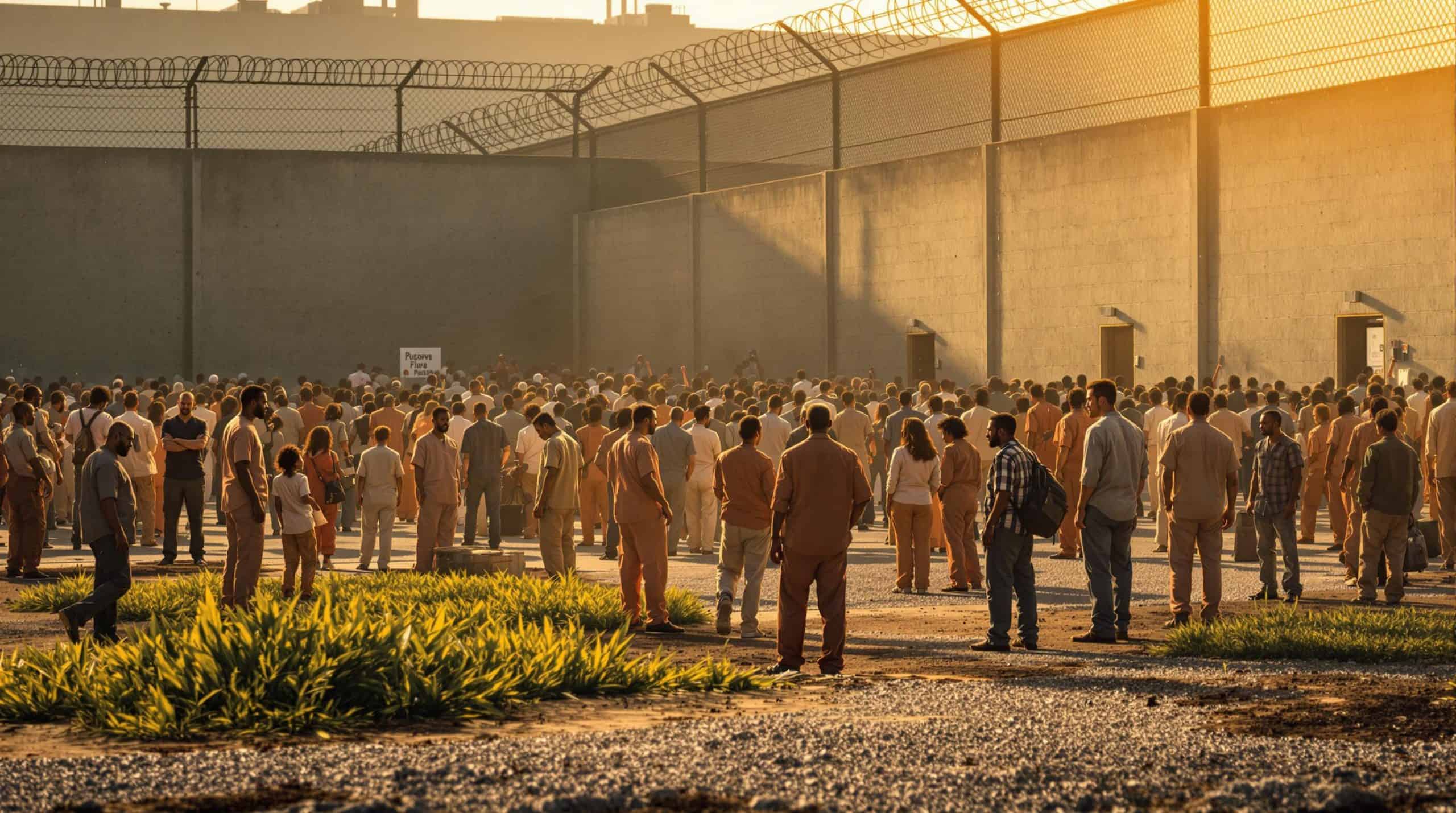Georgia’s prison system is in crisis. Nearly 50,000 inmates face unsafe conditions, unchecked violence, and inadequate healthcare due to severe understaffing and gang dominance. A 2024 DOJ report highlights key failures:
- Staffing shortages: Over 70% of correctional officer positions are vacant in some facilities, leaving large areas unsupervised.
- Escalating violence: Homicides in prisons rose by 400% since 2018, with 142 deaths reported in five years.
- Gang control: Gangs exploit weak oversight, running contraband operations and threatening rehabilitation efforts.
- Constitutional violations: Inmates endure cruel and unsafe conditions, violating the 8th Amendment’s protections.
Despite a $1.2 billion budget, the system fails to ensure safety, address racial disparities, or provide basic healthcare. Advocates and federal investigations demand urgent reforms to fix these systemic issues.
DOJ finds Georgia prison conditions ‘out of control’ and ‘unconstitutional’
Major Failures in Georgia’s Prisons
Georgia’s prison system is in deep crisis, with failures that jeopardize the safety of inmates and undermine the principles of justice. Investigations have uncovered severe institutional problems that demand immediate action.
Overcrowding and Staff Shortages
As of December 2023, nearly half of all correctional officer positions in Georgia’s prisons were vacant, with an average vacancy rate of 49.3%. In 18 facilities, this rate exceeded 60%, and 10 facilities were operating with more than 70% of positions unfilled [1] [4]. With close to 50,000 inmates housed across the state, this staffing shortage has left large areas unsupervised. These gaps in oversight have allowed violence and gang activity to flourish, putting lives at risk and raising serious legal concerns.
Violations of Constitutional Rights
Homicides in Georgia prisons have increased by a staggering 95.8% between 2018 and 2023. During this period, 142 inmate deaths were reported, highlighting the system’s failure to ensure basic safety [1]. Vulnerable groups, such as LGBTI individuals, face even greater risks of violence and sexual abuse, often without adequate protection from prison staff.
Unsafe Living Conditions and Poor Healthcare
Healthcare in Georgia’s prisons is critically underfunded and insufficient. Basic security measures are also failing, with issues like broken lock controls, poor tool management, and insufficient key control contributing to a dangerous environment. For the nearly 10,000 inmates serving life sentences, the lack of proper medical care creates a dire humanitarian problem [4].
The situation reached a boiling point in December 2023 at Central State Prison, where two separate stabbing incidents occurred, one of which was fatal [1]. These events underscore the urgent need for reforms to improve safety and uphold basic human rights in Georgia’s prisons.
How Gangs Worsen Prison Problems
Gang activity in Georgia’s prison system has created a vicious cycle, intensifying existing problems and introducing new challenges for both inmates and staff.
Gangs’ Control Over Prisons
Severe understaffing – where nearly half of correctional officer positions remain vacant – has left the door wide open for gangs to take over. These groups control everything from bed assignments to smuggling contraband and orchestrating violence. They’ve essentially built their own power structures within the prisons. The DOJ’s investigation highlights how gangs exploit these staffing shortages and even manipulate corrupt staff to maintain their grip on the system [3].
"The leadership of the Georgia Department of Corrections has lost control of its facilities", said Ryan Buchanan, U.S. Attorney for the Northern District of Georgia [3].
This blunt statement reflects just how deeply systemic these issues have become. Commissioner Tyrone Oliver has also pointed out that understaffing and outdated facilities have played a direct role in allowing contraband and gang activity to flourish [2]. The situation is especially dire in ten of the state’s major facilities, where gang dominance has effectively dismantled safety protocols and administrative control [4].
Impact on Safety and Rehabilitation
The unchecked influence of gangs has had disastrous effects on prison safety and rehabilitation efforts. Since 2018, homicides in Georgia’s prisons have skyrocketed by 400%, with 142 deaths reported over five years – clear evidence of the escalating violence driven by gang control [1][3].
This environment of constant violence has made rehabilitation nearly impossible. Inmates who want to participate in programs often face threats or retaliation from gang members who see such efforts as acts of defiance.
The Georgia Department of Corrections has struggled to maintain even basic safety standards across its 38 facilities. Gang control disrupts daily routines, undermines essential services, and derails the primary goal of preparing inmates for life outside prison.
The dominance of gangs in Georgia’s prisons is not just a standalone issue – it’s a symptom of deeper institutional failures. Tackling gang influence is essential to restoring safety and functionality, but broader reforms are needed to protect inmates’ rights and improve overall conditions.
sbb-itb-7858f51
Efforts to Improve Georgia’s Prisons
Georgia’s prison system faces serious challenges, but various organizations and advocates are working to bring about change. Their initiatives span grassroots activism, legal actions, and policy reforms aimed at transforming the correctional facilities in the state.
Georgia Prisoners’ Speak (GPS): Advocating for Inmates

GPS amplifies the voices of inmates, sheds light on constitutional violations, and engages the public through campaigns and tools designed for citizen involvement. By documenting prison conditions and supporting families with resources and advocacy, GPS plays a key role in pushing for reform. Their work is part of a larger movement that includes federal oversight initiatives and legal advocacy efforts.
Drawing Inspiration from Federal and State Reform Models
Georgia can take cues from the Federal Prison Oversight Act, which focuses on improving staffing, implementing better safety measures, and establishing independent oversight. Commissioner Tyrone Oliver has acknowledged the challenges and started taking initial steps to address these issues. While these reforms are important, legal action remains a powerful way to ensure accountability.
Legal and Community Advocacy Efforts
Legal advocates are using constitutional protections to push for systemic changes. Advocacy groups, legal experts, and reform organizations are working together to address immediate safety concerns and push for structural improvements.
The Department of Justice’s involvement has added weight to these efforts, offering a framework for reforms that meet constitutional standards. Stakeholders across different sectors are collaborating to address the deep-rooted problems in Georgia’s prison system [2][3].
Key issues identified in federal investigations – such as staffing shortages, unsafe facilities, and lack of oversight – remain a focus for advocacy groups. Through persistent legal and public awareness campaigns, these efforts are gradually creating momentum for meaningful changes in Georgia’s correctional system [3][4].
Legal Tools to Protect Inmates’ Rights
The 8th Amendment of the U.S. Constitution plays a critical role in addressing the ongoing issues within Georgia’s prison system. By leveraging this constitutional protection alongside targeted litigation, advocates can push for accountability and drive much-needed reforms.
Using the 8th Amendment
Georgia’s prisons face severe understaffing and unchecked violence, creating conditions that violate the 8th Amendment’s ban on cruel and unusual punishment. Overcrowding, gang control, and escalating violence highlight the urgent need for enforcing these constitutional protections. Federal investigations have documented these systemic failures, further emphasizing the necessity of action [1].
The Role of Lawsuits in Reform
Class action lawsuits serve as a powerful tool to combat unconstitutional conditions in prisons. Organizations like the Southern Center for Human Rights have used litigation to address issues such as inadequate medical care, unsafe environments, and staff violence. These efforts have resulted in court-ordered improvements in healthcare, sanitation, and oversight.
Findings from the Department of Justice (DOJ) strengthen these legal efforts by exposing systemic issues. For instance, the DOJ revealed that 59% of Georgia’s prison population is Black, compared to 31% of the state’s overall population [3]. Legal actions have led to reforms such as:
- Increased staffing and supervision
- Changes to classification and housing systems
- Better incident reporting and investigation processes
- Stronger protections against gang-related violence
While these legal tools have proven effective, they require consistent advocacy and monitoring to ensure lasting change. The Justice Department’s 13-page reform recommendations outline actionable steps to address constitutional violations [3][4]. By combining legal strategies with persistent oversight, meaningful reforms in Georgia’s prison system can be achieved.
Conclusion: Time to Fix Georgia’s Prisons
Georgia’s prison system faces a breaking point. The DOJ’s October 2024 report paints a grim picture of a system under immense strain, with the state’s prison population – fourth-largest in the country – demanding immediate attention. Rising violence and severe staffing shortages highlight just how urgent the situation has become.
"Individuals incarcerated by the Georgia Department of Corrections should not be subjected to life-threatening violence and other forms of severe deprivation", said U.S. Attorney Ryan Buchanan [2], stressing the need for immediate reform.
Some steps have been taken. State initiatives, like funding studies and seeking external expertise, are beginning to tackle staffing and safety concerns [2]. Advocacy groups such as GPS are working hard to push lawmakers and rally public support for faster reforms.
But with nearly 50,000 inmates spread across 38 facilities [2], the challenge is massive. While collaboration with the Justice Department offers a glimmer of hope, real progress depends on consistent public pressure. Without swift and effective action, the system’s failures will continue to harm inmates, destabilize communities, and weaken trust in Georgia’s justice system.
Small fixes won’t cut it anymore. Georgia needs targeted reforms to curb violence, fix staffing issues, and protect inmates’ constitutional rights. It’s time for lawmakers, advocates, and citizens to step up and push for meaningful change to ensure safety and dignity for everyone in the system.

